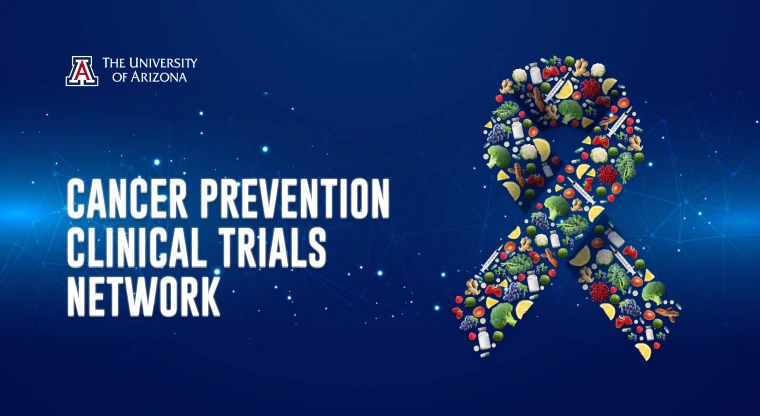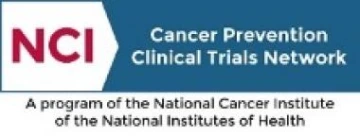
The University of Arizona Cancer Prevention Clinical Trials Network (UA CP-CTNet) is a major program funded by the National Cancer Institute, Division of Cancer Prevention to perform early phase clinical trials to evaluate the clinical activity and biologic effects of putative preventive agents and to determine clinically relevant correlates in order to identify agents with good safety profiles and preliminary efficacy. Scientific and clinical evidence generated from these early phase cancer prevention clinical trials will contribute significantly to the clinical development of safe and effective agents for cancer prevention.
The University of Arizona Cancer Center received an $8.6 million grant from the National Cancer Institute for the UA Cancer Prevention Clinical Trials Network, one of only five such networks funded by the NCI.
FAQs & Information
The overall objective of University of Arizona Cancer Prevention Clinical Trials Network (UA CP-CTNet) is to perform early phase clinical trials to evaluate the clinical activity and biologic effects of putative preventive agents and to determine clinically relevant correlates to identify agents with a good safety profile and preliminary efficacy for definitive trials.
Aim One: Efficiently design and conduct Phase 0/I/II clinical trials to assess the cancer preventive potential of repurposed drugs that affect multiple chronic diseases, well-characterized nutraceutical agents, regional/topical drug delivery, and immune modulators, rigorously identified from translational research, epidemiological studies, and/or clinical research.
Aim Two: Characterize the clinical activity and biological effects of putative cancer preventive agents on their defined molecular/biochemical targets, the immune surveillance network, surrogate endpoints associated with carcinogenesis, and other biological effect markers identified in preclinical studies.
Aim Three: Develop further scientific insights into the mechanisms of cancer prevention by the agents studied and to develop novel potential markers as determinants of response and for selecting subpopulations who may differentially benefit from the studied agent.
Through the conduct of rigorously designed early phase cancer prevention clinical trials, the UA CP-CTNet will determine the clinical activity and biological effects of potential preventive agents. The research findings will further scientific insights into the mechanisms of cancer prevention and develop novel potential biomarkers as determinants of response. Scientific and clinical evidence generated from these early phase cancer prevention clinical trials will contribute significantly to the decision for advancing a candidate agent for further clinical development for cancer prevention.
The collaboration in UA CP-CTNet cover a wide range of transdisciplinary expertise that offer the opportunities of developing agents for:
- Melanoma and Non-Melanoma Skin Cancer Prevention
- Lung and Upper Aerodigestive Cancer Prevention,
- Breast and Gynecologic Cancer Prevention,
- Prostate and Urologic Cancer Prevention
- Gastrointestinal Cancer Prevention.
Currently, there are three NCI-supported CP-CTNet trials:
- An Extended Follow-up Study of the HPV Vaccine Delayed Booster Trial (Active: Not Recruiting)
- Biomarker Development for Early Phase Melanoma Prevention Trials (Active: Not Recruiting)
- Clinical Study of Bioactivity of Low Dose Apalutamide in Prostate Cancer Patients Scheduled for Prostatectomy (Pending Activation)
For More information on the UA CP-CTNET please contact the University of Arizona Cancer Prevention Clinical Trials Network at 520-321-7444 OR UACC-CPRE@UACC.arizona.edu


The University of Arizona Cancer Prevention Clinical Trials Network (UA CP-CTNet) is conducting an extended follow-up study with study participants of the original “HPV Vaccine Delayed Booster Trial” to determine if a single dose of Gardasil 9 with a delayed booster injection at 24 months show a stable response after the booster.
The National Cancer Institute sponsors this study, which is conducted under the direction of UA CP-CTNet Principal Investigators, H-H Sherry Chow, PhD and Julie Bauman, MD, MPH, and Protocol Principal Investigator, Yi Zeng, MD, PhD.
This study is being done to answer the following questions:
- Can the delayed booster injection of Gardasil 9 generate stable and persistent immune response to protect against HPV infection?
- Can we detect HPV virus and antibodies in urine?
Background for conducting this trial:
Human papillomavirus (HPV) infection is the most prevalent precursor for cervical cancer and is associated with the development of several genital cancers as well as oral cancers in both women and men. The available HPV vaccines are very effective in preventing HPV-attributed cancers. A 2-injection vaccine schedule with the second injection given 6-12 months after the first injection is recommended for children ages 9 through 14 years.
Analysis of prior clinical trials data suggests that a single injection of HPV vaccine may give a sufficiently strong immunogenic response to elicit a degree of protection against HPV- associated cancers. These data raise interesting prospects for potential efficacy of a single injection of vaccine and raise hopes for substantial cost savings and logistical simplifications for HPV vaccine implementation across the globe.
The original “HPV Vaccine Delayed Booster Trial” was conducted to determine if a single dose of Gardasil 9, the only HPV vaccine available in the United States can generate stable and persistent immune response in preteen girls and boys. The analysis of the immune response in the original “HPV Vaccine Delayed Booster Trial” is ongoing. The preliminary findings suggest that the response to the two most common types of HPV are persistently detected for up to 24 months after a single dose of Gardasil 9. As of 2019, there are ongoing supply constraints/shortages of HPV vaccines globally. Our preliminary findings contributed to the upcoming recommendation from the World Health Organization to consider delaying the booster dose in young girls to ensure maximum coverage of age-appropriate recipients.
The original “HPV vaccine delayed booster trial” will allow for determination of the stability and persistence of antibody response after a single dose of the HPV vaccine over 24 months. The follow-up trial will help determine if the 24-month delayed booster of the vaccine will generate a stable and persistent immunologic response. A stable and persistent immunogenicity infers lasting protection against HPV infection. These studies are expected to inform future HPV vaccination policy to improve vaccine uptake and implementation to prevent HPV-attributed cancers and diseases.
For questions, contact the University of Arizona Cancer Prevention Clinical Trials Network at 520-321-7444 or UACC-CPRE@UACC.arizona.edu.


Karen Hastings, MD, PhD
The University of Arizona Cancer Prevention Clinical Trials Network (UA CP-CTNet) is conducting a study to develop biomarkers that can be used in early phase melanoma prevention trials.
Melanoma is the most serious form of skin cancer. Sun exposure remains the major environmental risk factor for developing melanoma. The incidence of melanoma continues to increase despite public health initiatives that have promoted sun protection. For this reason, it is important to pursue investigation of new approaches to melanoma prevention such as chemoprevention.
Previous studies suggest that regular use of non-steroidal anti-inflammatory drugs (NSAIDs) such as sulindac may reduce the risk of melanoma, although there are some inconsistencies in the data. In collaboration with Stanford University, University of Arizona conducted a trial of sulindac to evaluate its use in melanoma prevention in individuals with multiple atypical nevi (abnormal moles). The study showed that sulindac was distributed to the moles and also demonstrated some biological activities in the nevi, supporting continued clinical development of sulindac for melanoma prevention. In planning for a follow-up sulindac trial, the study team identified the critical need for further development of biomarkers for early phase melanoma prevention trials. This proposed biomarker development research is critical to the design of a follow-up sulindac trial to provide more compelling evidence to qualify sulindac for future trials.

Clara Curiel, MD
The specific aims of this study are to develop molecular signatures to distinguish the stages of melanoma progression and to determine the effects of sulindac intervention on gene expression profile by analyzing tissue samples from the previous sulindac trial.
This study is sponsored by the National Cancer Institute and conducted under the direction of UA CP-CTNet Principal Investigators H-H Sherry Chow, PhD and Julie Bauman, MD, MPH. The study investigators include Karen Hastings, MD, PhD, Clara Curiel, MD, and Bonnie LaFleur, PhD. Kenneth Buetow, PhD will provide bioinformatics expertise.
For Questions, contact the University of Arizona Cancer Prevention Clinical Trials Network at 520-321-7444 OR UACC-CPRE@UACC.arizona.edu


Who may be eligible? Men who have been diagnosed with prostate cancer and are scheduled for a prostatectomy (removal of the prostate gland).
Who is conducting the study? The study is conducted by the Cancer Prevention Clinical Trials Network and sponsored by the National Cancer Institute.
What is the purpose of the Study? The purpose of this study is to determine whether low dose Apalutamide will lead to lowered Prostate-Specific Antigen (PSA) levels in men with prostate cancer that is confined to the prostate gland. Apalutamide is a medication used to treat prostate cancer patients with advanced stages of the disease.
How long is the study? The study may take 6 to 14 weeks to complete depending on when the prostatectomy is scheduled.
What is required during the study?
- There are three required study visits, plus weekly communication with the study staff.
- Study participants provide information about their medical history, prostate health-related quality of life, and alcohol and tobacco use.
- The study medication will be taken by mouth for 4 – 8 weeks before the scheduled prostatectomy (and up to 12 weeks in the event surgery is delayed)
- Blood is collected at each visit.
- Study participants keep a diary of when they take the study medication and the status of their general health.
Qualified participants receive study drug and study evaluations at no cost and up to $300 for their participation in the study.
If you are interested in participating and/or have questions, we will be happy to discuss this study with you further. Or, if you know someone who might be eligible for this study, please encourage them to call.
Call 520-321-7798 or email fminter@arizona.edu.

Researchers at the The University of Arizona Cancer Prevention Clinical Trials Network are recruiting regular cigarette smokers to participate in a new clinical study to evaluate Avmacol ES®, a plant-based pill made from broccoli sprout and seed extracts (BSSE) to find out if Avmacol ES® can help protect cells from tobacco smoke damage and cancer-causing chemicals.
Individuals who smoke are at increased risk for developing lung, head and neck, and other cancers. BSSE contains natural substances that have been shown to protect against some airborne toxins and pollutants, including some that are found in cigarette smoke. We want to find out if BSSE will help with the break down and removal of toxic substances caused by tobacco use and possibly protect cells from tobacco smoke-induced damage in individuals who currently smoke.
This study has public funding from the National Cancer Institute (NCI), part of the National Institutes of Health (NIH) in the United States Department of Health and Human Services.
Click here to fill out a brief questionnaire to see if you qualify for participation in this study.
Thank you for your interest in this important research!
HAVE YOU BEEN DIAGNOSED WITH LYNCH SYNDROME?

Lynch Syndrome (LS) increases the risk of colon cancer and can also increase the risk of other cancers, including cancer of the uterus, ovaries, small bowel, stomach, pancreas, urinary tract, skin and brain. Cancer prevention strategies for people with LS are therefore urgently needed. Using vaccines to train the body’s own immune system to prevent polyps and cancers is a new approach that we plan to test in patients with LS.
We are asking you to take part in this research study because you have been diagnosed with Lynch syndrome and your doctor has previously found polyps or cancer in your colon or rectum. This study is being done to find out if we can lower your chance of getting colon cancer and other Lynch cancers by giving you three vaccines, an approach called Tri-Ad5, in combination with an injectable immune-enhancer protein called N-803.
TESTING A COMBINATION OF VACCINES FOR CANCER PREVENTION IN LYNCH SYNDROME
Principal Investigators:
Ajay Bansal, MD - University of Kansas Medical Center
Eduardo Vilar-Sanchez, MD, PhD - University of Texas MD Anderson Cancer Center
The usual approach for patients with Lynch syndrome is to be followed closely by their doctor with regular colonoscopies, pelvic imaging (ultrasounds), urine tests, computerized tomography scans (CT scans), and skin examinations to watch for the development of cancer. Removal of the colon or uterus before cancer develops is also part of the usual approach. We are doing this study because we want to find out if the vaccines, we are testing will be effective at preventing colon polyps and cancers of the colon and other organs.
The purpose of this study is to compare the safety and effects of the Tri-Ad5 vaccines alone, or in combination with N-803, versus placebo on the risk of developing colon and other cancers in patients with Lynch syndrome. The Tri-Ad5 vaccines and N-803 are not FDA-approved.
This study is looking for volunteers who have been diagnosed with Lynch syndrome. We will enroll 158 participants at institutions across the country.
You may be eligible if:
- You have been diagnosed with Lynch syndrome and have had abnormal growths in your colon or rectum
- You have not had any cancer treatment in the past 6 months
- You are 18 years or older
- You are not pregnant or planning to get pregnant
If you think you may be eligible, please contact uacc-cpre@uacc.arizona.edu or 520-321-7444 to learn more about participating in this important study.

